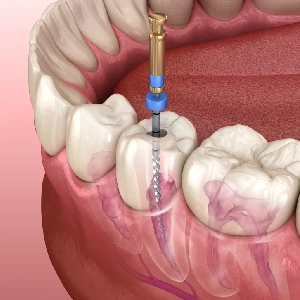Hearing the words root canal can make many patients feel anxious. Naturally, people wonder if they can avoid this procedure. The real question is: Can a tooth heal without a root canal? The answer is not straightforward. It depends on the severity of the damage, the condition of the tooth, and how early the issue is detected.
Let us explore whether natural healing is possible, what happens if you avoid a root canal, and whether alternatives exist for this treatment.

Can a Tooth That Needs a Root Canal Heal Itself?
A root canal is required when the pulp of the tooth becomes infected or inflamed due to deep decay, repeated dental treatments, or trauma. When this happens, symptoms such as severe pain, sensitivity, and swelling occur.
Unfortunately, a tooth that needs a root canal cannot heal on its own. Unlike soft tissues in the body, teeth do not regenerate damaged pulp. Once bacteria enter the pulp chamber, the infection spreads, leading to worsening pain, abscess formation, and potential bone loss.
However, if the inflammation is mild and has not yet turned into a full-blown infection, the condition may improve with proper care. Maintaining good oral hygiene, using fluoride treatments, limiting sugar intake, and following a dentist’s remineralization recommendations can help prevent further damage.
Despite preventive efforts, once decay reaches the pulp, professional treatment is the only way to save the tooth. If left untreated, the infection worsens and leads to severe complications.
What Could Happen If You Do Not Get a Root Canal?
Many patients delay a root canal due to fear, cost concerns, or the hope that the pain will disappear on its own. However, avoiding a necessary root canal can lead to severe consequences, including:
- Persistent and Worsening Pain: Tooth pain will not go away without treatment. Instead, it will become more intense as the infection spreads deeper.
- Spreading Infection: An untreated infection can extend beyond the tooth, affecting the gums, jawbone, and even the bloodstream. This can lead to more severe health issues, including systemic infections.
- Tooth Loss: As the infection progresses, the tooth structure weakens. Eventually, the tooth may become too damaged to save, leading to extraction. If this happens, the only solutions are costly tooth replacements such as dental implants, bridges, or dentures.
- Abscess Formation: A dental abscess is a pus-filled pocket caused by a bacterial infection. This can lead to swelling, fever, severe pain, and, in extreme cases, life-threatening complications if left untreated.
A root canal is designed to remove the infection, relieve pain, and preserve the natural tooth. Ignoring it only increases the risk of more invasive and expensive treatments.
Can a Tooth Heal Without a Root Canal?
The extent of tooth damage determines whether a tooth can heal without a root canal. If the decay is limited to the outer layers of the tooth, such as the enamel or dentin, remineralization may occur with proper oral care, fluoride treatments, and dietary changes.
However, once decay reaches the pulp, the infection is irreversible. When bacteria enter the pulp, the infection does not go away on its own. Instead, it worsens, causing severe pain, inflammation, and potential abscess formation. At this stage, a root canal is the only way to save the tooth.
If the pulp inflammation is minor and not yet infected, treatments like pulp capping may help prevent the need for a root canal. However, early intervention by a qualified dentist is essential.
Can Home Remedies Help?
Some patients search for natural remedies to avoid a root canal. While remedies like clove oil, garlic, turmeric, and saltwater rinses can provide temporary relief, they do not eliminate the infection.
- Pain relievers like ibuprofen or acetaminophen can reduce discomfort, but they do not cure the infection.
- Clove oil has antibacterial properties, but it cannot remove bacteria deep inside the tooth.
- Saltwater rinses may reduce swelling, but they cannot stop the infection from spreading inside the pulp.
- Garlic and turmeric have antimicrobial effects, but they cannot reverse decay or repair infected pulp.
While these methods may offer short-term relief, they are not substitutes for professional dental care. If your tooth is severely decayed, delaying treatment increases the risk of complications.
Alternatives to Root Canal Therapy When Possible
A root canal is often the most effective treatment, but in certain cases, alternatives may work.
- Pulp Capping: If decay has not reached the pulp, pulp capping can protect the tooth by sealing the affected area and preventing further infection.
- Ozone Therapy: Ozone gas can kill bacteria and disinfect cavities. However, this is not a guaranteed alternative to a root canal.
- Tooth Extraction: If the infection is too severe, an extraction may be necessary. In such cases, a dental implant, bridge, or partial denture can replace the missing tooth.
- Regenerative Endodontics: This emerging technique uses stem cell therapy to regenerate damaged pulp. While promising, it is still under research and not widely available.
Not all cases qualify for these alternatives. A dentist will evaluate your condition to determine the best treatment plan.
Takeaway
So, can a tooth heal without a root canal? The simple answer is no if the pulp is already infected. Once bacteria reach the pulp, the only way to remove the infection and save the tooth is through a root canal or, in extreme cases, extraction.
Early treatment is crucial. If you suspect a problem, do not wait. Delaying treatment can result in severe pain, tooth loss, and more costly procedures later on.
Schedule Your Root Canal Appointment Today!
If you are experiencing severe tooth pain or suspect you need a root canal, do not delay treatment. Our experienced dentists at Dentistree Dental Hospital provide gentle, pain-free root canal therapy to save your natural tooth.
Call us today at 01 206089145 to book your appointment or Visit us at #439/7, Tondan Marg, near CMS Chowk, Thakurganj, Lucknow, Uttar Pradesh 226003.
FAQs
How Long Can a Tooth Survive Without a Root Canal?
The survival time of an infected tooth without a root canal depends on the severity of the infection. Some individuals experience pain and complications within days, while others may go weeks or months. However, delaying treatment increases the risk of tooth loss and spreading infection.
How Long Can You Wait to Have a Root Canal Done?
The longer you wait, the worse the infection becomes. Some people feel pain immediately, while others experience symptoms later. Even if pain is minimal, an untreated infection can silently damage the tooth and surrounding bone, leading to irreversible damage.
Can an Infected Tooth Be Saved Without a Root Canal?
If the infection has reached the pulp, a root canal is usually the only way to save the tooth. However, if the pulp is still intact and the infection is minor, treatments like pulp capping, ozone therapy, or antibiotics may help temporarily, but they are not permanent solutions.
What Will Happen to My Tooth If I Don’t Get a Root Canal?
Without a root canal, the infection will keep spreading, leading to severe pain, abscess formation, and bone loss. Over time, the tooth will decay beyond repair and may need extraction, which can result in the need for costly tooth replacements like implants or bridges.
Can You Naturally Heal a Tooth That Needs a Root Canal?
No, an infected tooth cannot heal naturally. The infection will worsen, leading to severe complications such as abscess formation, increased pain, and potential tooth and bone loss. Only professional dental treatment can fully remove the infection and save the tooth.



